How Much You Should Pay to See: ‘The Dark Knight Rises’
by Ester Bloom and Adam Freelander
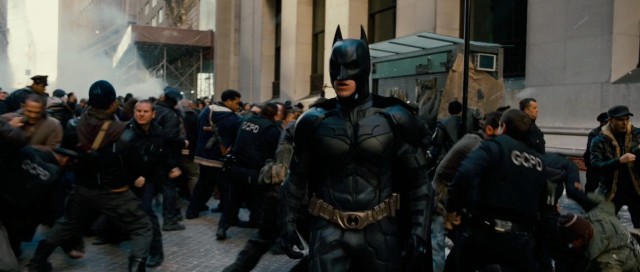
NOTE: Adam and Ester saw The Dark Knight Rises together over the weekend, and then Adam saw it AGAIN on Tuesday, in IMAX. Because research.
Adam: Hello!
Ester: So! How was it in IMAX?
Adam: Better. I kind of think that’s the way to do it.
Ester: Ooh, yeah? But then, how much did that cost? And why did it improve it?
Adam: So it was 20 bucks. which is a lot, though it may only be that much at the Loews Lincoln Square where I saw it. I think I did not realize how much of the movie was shot in IMAX. (You can tell when it switches, because the aspect ratios are different.) It’s gotta be almost half the movie.
Ester: Oh wow. $20 is a LOT for one movie-going experience, even if it is almost 3 hours long. But now we’re starting at the end!
Adam: Yeah let’s come back to this.
Ester: So, the Dark Knight of the Soul, huh? Was this movie more or less grim than you anticipated, considering the previous two?
Adam: Interesting first question. I think it’s certainly less grim than the 2nd film. But it’s less everything, really.
Ester: Oooh, what makes you say that?
Adam: Well this is maybe my major complaint with the movie. It totally lacks the highs and lows of the previous movie. And I should say I enjoyed it overall. But…there’s just no single thing in it as good as Heath Ledger.
Ester: That is true, though I did very much enjoy Anne Hathaway.
Adam: We both did!
Ester: Her performance was worth at least $3-$5 of the ticket price, whereas Heath Ledger’s was worth the whole kit & caboodle.
Adam: Yeah, how dumb does it feel saying that Anne Hathaway elevates this Batman movie? But it’s true.
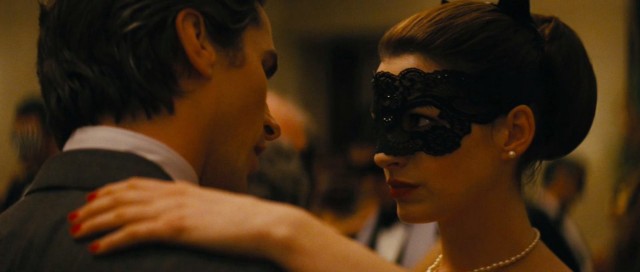
Ester: Ledger was mesmerizing. And, as Dan Kois pointed out in the Slate Spoiler Special on this movie, he really made that film come alive — he was responsible for all the surprises. Or his character was, anyway. This movie was shorter on surprises.
Adam: Haha, we both listened to that podcast in advance of this chat. We’re the worst.
Ester: WE’RE THE BEST.
Adam: Literally, we the best forever. But yes, totally: part of what made The Dark Knight was that combination of a truly scary villain with twist after twist that really convinces you that everything has gone to shit.
Ester: We’re well-informed! Also we both read the Awl chat about this movie, which we disagreed with: They thought the take-away message was anti-Occupy; I felt it was more anti-Wall Street, that you can’t trust the private sector — i.e., philanthropists like Bruce Wayne and Marion Cotillard — to develop nuclear energy sources to solve big problems, or even necessarily to take care of a city’s orphans. Because if Bruce Wayne ducks out of sight for a while, everything goes to shit.
Adam: True, though I do think the politics of this trilogy of Batman movies have always been a little fucked up. I’m thinking about the sonar-surveillance business that is basically the 3rd act of Dark Knight.
Ester: Yeah, my head was kind of spinning at that point of Dark Knight.
Adam: I think if you had to pin it down, Nolan’s philosophy is close to the ending of Metropolis. Remember? Something about, the head and the hands BOTH need the HEART? i.e., the working class and ruling class both need…heart. I don’t know what “heart” represents, but it is probably Batman.
Ester: Man, Metropolis is a great movie. Although you’re just trying to shore up your film skool cred now, aren’t you?
Adam: Yeah I hope it’s not too obvious?
Ester: Batman’s hands, head, and heart all take a beating in this movie. There’s an interesting subtext about suffering and whether it builds character.
Adam: Subtext? Interesting?
Ester: OK fine! Christopher Nolan and Hans Zimmer kick the viewer with the force of a horse on steroids with the idea that suffering builds character, and perhaps people who are born privileged will never be as tough as those born in The Pit of Despair.
Adam: Spoiler alert Pit of Despair. But also who cares, basically every movie has a Pit of Despair at this point.
Ester: The Pit of Despair could be an abstract metaphorical construct, but yes, spoiler alert, this film contains a literal Pit of Despair.
Adam: OK I have a big question. How did you feel about how LONG this movie is?
Ester: Honestly, Dark Knight felt longer while I watching it because there were so many twists and turns — it was exciting but I was also aware of how many different stories it was telling. Because this one was more streamlined in that way, the length didn’t bother me as much in the moment. What about you? Did it seem longer in IMAX?
Adam: Ha, no, it felt the same length. It did feel taller. But I think the main reason this movie feels long to me, even longer than The Dark Knight (which it is), is because it commits one of my most hated script crimes: having lots of time pass in the middle of the movie. Like, this movie essentially has a “6 months later” moment in the middle. NO. Don’t do that.
Ester: Ahhh, yes. You’re right, it does span a significant length of time. Myself, I get more annoyed at voiceovers, at least ones that aren’t done by Morgan Freeman.
Adam: So how did that affect your feelings on an all-voiceover villain?
Ester: Heh. Yeah, I too would have liked to see his mouth and face move.
Adam: I mean, god bless Tom Hardy. The guy does yeoman’s work here. But he has an IMPOSSIBLE TASK.
Ester: Yes and yes.
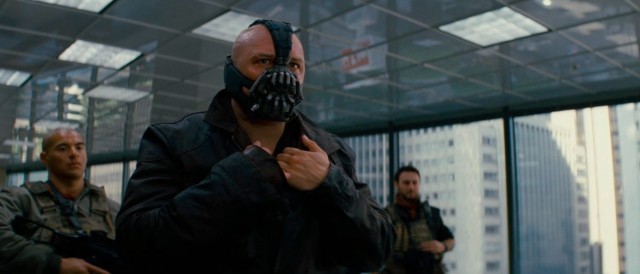
Adam: Those are two big ways in which the movie sets itself up to not succeed: 1) Put your best actor in a steel crab-mouth ding dong, and 2) Try to tell a story in which WAY too much time passes. (Incidentally, this is sort of why biopics suck. They cover too much time and eventually the main character is covered in old-face.)
Ester: YES. Or rather, why biopics should just focus on a particular exciting period in a person’s life. But considering that, the film is remarkably successful. Because you’re totally right, and yet I did enjoy it.
Adam: Yeah. You more than me, but we both liked it.
Ester: (I may have liked it more, but you’ve seen it twice and spent at least $28 on it.)
Adam: And yet it’s so problematic. Part of it is that the movie is just really relentless in how much STUFF it tries to cram in. There’s just a lot of stuff in it.
Ester: And Bane as a villain is so heavy-handed. Whereas I feel like the Joker was up-ending action movie cliches left and right, Bane is just a typical violent masculine cipher. Even though he does turn out to have a weirdly sweet backstory.
Adam: Yeah, we keep coming back to this, which I think shows how strongly it impairs this movie: after Heath Ledger’s joker, you just don’t have anywhere else to go.
Ester: RIGHT. Yes. That’s the problem with making the second installment of your trilogy so frighteningly memorable. You raise the stakes, which is rough if you can’t then meet them again.
Adam: I think that’s fairly common in movie trilogies, for the 2nd film to be the high water mark. And in the complete context of this Batman trilogy, that’s forgivable. But we’re talking about this particular movie, which just isn’t as good as the last one.
Ester: Is it common? Is Toy Story 2 the best? The Two Towers? I’m trying to remember. But okay, let’s talk about money in this film, because it plays an important role, both on-screen and off.
Adam: Yes. Wall Street. Occupy Wall Street. The stock exchange. Wallets. ALL THINGS IN THIS MOVIE. Well, Occupy Wall Street isn’t actually in the movie. OR IS IT.
Ester: NO IT ISN’T.
Adam: OR IS IT.
Ester: STOP IT.
Adam: Fiiiiiiiiiiine.
Ester: Bane’s men — mercenary gun-wielding ninjas — have no real political agenda. From what I could tell. They weren’t a bunch of well-meaning, earnest, ripe-smelling young idealists.
Adam: So what is the comment being made about the Occupy movement in this movie? Is there one at all? Or is the resemblance just a red herring to lend the movie some relevance/urgency?
Ester: I’ll go with Door #3. Red herring.
Adam: Ah, good choice, very tasty. I think a frustrating thing about this movie is that not only does it not have a ton to say about those big questions of our times; it commits the crime of PRETENDING to have something to say. Like, Anne Hathaway whispering “there’s a storm coming” into Batman’s ear gave me some chills, I am not going to lie about this. But the payoff doesn’t come.
Ester: Very true. I liked it though! In the moment.
Adam: I think that moment is great!
Ester: Yeah. There are great hints about class stuff, but then it’s not really born out.
Adam: Like, ultimately, this is not a movie about whether the rich are Good or whether the common man is Good. This is a movie about, and I can’t believe I am writing this, How Batman Got His Groove Back.
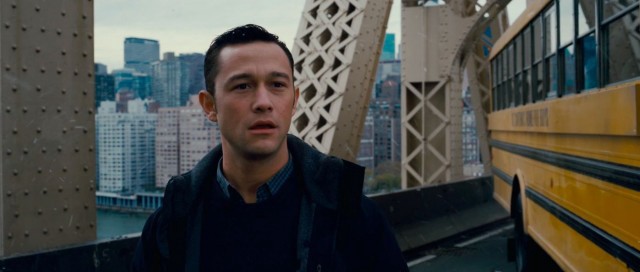
Ester: Yes. So let’s talk bottom line. I paid $8 to see this movie and it was well-worth that. (Of course, air conditioning & a seat out of the sun for 3 hours would have been worth at least $5.)
Adam: I paid $8 and then, later, I paid $20.
Ester: You enjoyed the $20 experience more.
Adam: Yeah. It appears that the more you pay, the better the movie is. if you can find a way to pay $50 to see the movie, I bet it would be AMAZING.
Ester: Hee! But which amount better reflected how much you thought the experience was worth?
Adam: Well, I think $20 is so much money for a movie. Like, In This Economy. Kids these days. Obama.
Ester: True, true.
Adam: BUT, I do think there’s a huge amount to be said for seeing a movie the way the filmmaker intended it, and Nolan CLEARLY wants people to see this in IMAX. Almost half the movie is in IMAX. It really makes it a pretty awesome experience.
Ester: OK.
Adam: Also, I think I want to make sure I’m clear about something, or at least make an attempt to pre-emptively deny my own hypocrisy.
Ester: Uh huh …
Adam: I think movies like this demonstrate that there isn’t a direct correlation between how “good” a movie is and how much it’s “worth” to see it.
Ester: How philosophical! Say more about that.
Adam: Like, I do think this movie is problematic. It has script issues. It has pacing issues. You can’t see the goddamn villain’s mouth. Yet, I spent $20 on a ticket to see it, and I do not regret that investment at all, in the slightest. To be able to get out of yesterday’s 90-degree heat, and watch a long, intense action movie on that crazy Lincoln Square IMAX screen, with good friends and an enormous soda…like, why else am I alive?
Ester: Aha! Yeah, that makes sense. There is an intangible quality to all of that that’s hard to put a price tag on.
Adam: Right. I can’t in good conscience dock this movie dollars for not being as good as the last Batman. And further, I can’t really recommend that you just wait to see this on Blu-ray or Netflix, because it’s literally not going to be the same.
Ester: And it speaks to another question: Are huge ambitious summer blockbuster movie events worth paying more for than smaller movies, even ones that are technically “better”? Especially if the smaller movies — documentaries, indies, etc — play just as well on Netflix?
Adam: Right, you are exactly right. There are compelling reasons to see smaller, Better films in the theater, but they are different reasons.
Ester: Supporting artists! Supporting quality!
Adam: Being part of a conversation. Sharing an emotional experience with a crowd, or with the culture at large.
Ester: Does this just come down to “Movies” vs. “Films”? They are, and can be, valued differently. Or their value can be assessed differently.
Adam: I’d say big vs. small, but yeah.
Ester: Magic Mike needs to make way less money than Dark Knight Rises to make people take note, and indeed it has.
Adam: But, like I said last time, that “small” movie was also totally worth seeing in the theater for the audience’s reactions.
Ester: That’s true.
Adam: And that’s where you can quantify the value of the moviegoing experience: In what way did seeing a movie WHERE and WHEN you saw it make your experience better?
Ester: Yeah. I remember where I was when I saw “Y Tu Mama Tambien” and “Being John Malkovich” in the theater, for example, and it totally added to both experiences to be spellbound in a seat surrounded by equally spellbound audiences. I mean, no one moved during the credits. People were just gobsmacked. It was great.
Adam: RIGHT. THAT’S what we pay for.
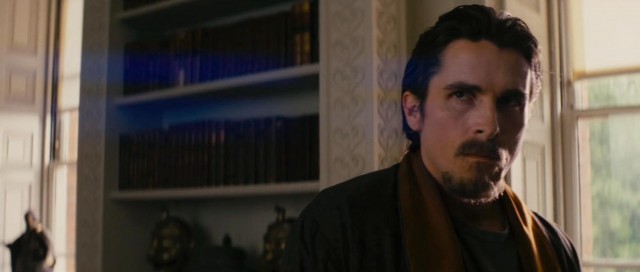
Ester: Batman is totally worth seeing in the theater, IMAX or regular, that’s for sure. I’d put the value at $15.
Adam: I do think $20 is justified if you see it on a true IMAX screen. Otherwise, try to find a matinee like we did and see it for cheap!
Previously: Magic Mike
Ester Bloom has never visited an actual Pit of Despair, but she has seen Princess Bride like 50,000 times. Follow her @shorterstory. Adam Freelander still has a poster of Jim Carrey as the Riddler up in his childhood bedroom. From 1995. Just never cared enough to take it down. Follow him @adamplease.
Support The Billfold
The Billfold continues to exist thanks to support from our readers. Help us continue to do our work by making a monthly pledge on Patreon or a one-time-only contribution through PayPal.
Comments